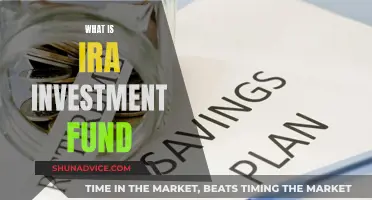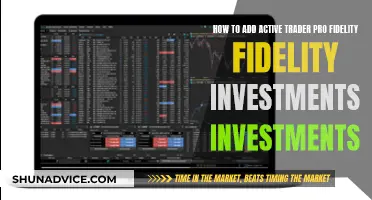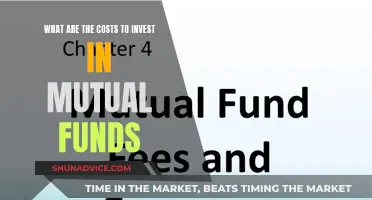
Alternative Investment Fund Managers (AIFMs) are entities that manage one or more alternative investment funds (AIFs). AIFMs are responsible for investment, portfolio and risk management decisions, asset valuation, distribution, compliance and oversight of delegates. AIFs are a way for investors to diversify their portfolios and can include private equity, real estate funds, private debt, infrastructure, hedge funds and other assets. The Alternative Investment Fund Managers Directive (AIFMD) was implemented in the EU in 2013 to regulate the managers of these funds, rather than the funds themselves. This was in response to the 2008-09 global financial crisis, which was rooted in alternative investment vehicles such as subprime mortgages.
| Characteristics | Values |
|---|---|
| Definition | Any legal person whose regular business is managing one or more alternative investment funds (AIFs) |
| Regulation | The Law of 12 July 2013 on alternative investment fund managers |
| Objective | Verify that AIFMs observe all legal, regulatory and contractual provisions relating to their organisation and operation |
| Purpose | Ensure investor protection and stability of the financial system |
| Scope | Broad; captures the management and marketing of AIFs or "AIFs" (most vehicles regarded as "funds", as well as vehicles one might not think of as a "fund") |
| Implementation | Requires each EU Member State to enact domestic legislation; supplemented by directly applicable Level 2 Regulations at the EU level |
| Compliance | Expensive and time-consuming, especially for small and medium-sized organisations outside the EU |
| Marketing | EU-wide marketing was previously limited to conventional stock, bond and income funds |
| Importance | Ensure investor access to information, oversee fund managers, minimise systemic risk, and create a single EU-wide market for AIFs |
What You'll Learn

Alternative Investment Fund Managers Directive (AIFMD)
The Alternative Investment Fund Managers Directive (AIFMD) is a European Union (EU) regulation that applies to alternative investments. The directive sets standards for marketing around raising private capital, remuneration policies, risk monitoring and reporting, as well as overall accountability.
The primary goal of the AIFMD is to protect investors and reduce the systemic risk that alternative investment funds can pose to the EU and its economy. It is a regulatory framework that applies to EU-registered hedge funds, private equity funds, and real estate investment funds. The AIFMD was implemented to better regulate alternative investments that were left largely unchecked before the 2008-09 global financial crisis.
The directive aims to protect investors and reduce the systemic risk that these types of funds can pose to the EU and its economy. The global financial crisis was rooted in alternative investment vehicles such as subprime mortgages. After the crisis, the EU moved to regulate the alternative investment industry, particularly hedge funds, real estate funds, and private equity. Many of these vehicles remained largely unregulated on a grand, global scale and were virtually unchecked in the EU.
Alternative investments such as private equity and hedge funds were largely unregulated in the EU before the global financial crisis. The AIFMD was implemented in the EU in 2013. Rather than pass regulation on the funds themselves, the directive's aim is to regulate the fund managers. Any manager that operates a fund in the EU is subject to AIFMD regulation, regardless of whether it is set up within or outside the union's borders. The institutional funds that fall under the AIFMD were previously outside of EU financial regulations for disclosure and transparency, including the Markets in Financial Instruments Directive (MIFID), which aimed to boost transparency across the union's financial markets.
The AIFMD has two major objectives. Firstly, it seeks to protect investors by introducing stricter compliance around how and what information is disclosed. This includes conflicts of interest, liquidity profiles, and an independent valuation of assets. The directive points out that alternative investment funds are only intended for professional investors, although some member states can choose to make these funds available to retail investors as long as additional safeguards are applied at a national level.
The second objective is to remove some of the systemic risks these funds can pose to the EU economy. To achieve this, the AIFMD mandates that remuneration policies be structured in a way that does not encourage excessive risk-taking, that financial leverage is reported to the European Systemic Risk Board (ERSB), and that the funds have robust risk management systems that take liquidity into account.
TSP G Fund: A Guide to Investing
You may want to see also

The AIFMD's objectives
The Alternative Investment Fund Managers Directive (AIFMD) is a regulatory framework designed to regulate alternative investment fund managers in the EU. The directive was implemented in 2013, in response to the lack of regulation highlighted by the 2008-09 global financial crisis.
The AIFMD has two primary objectives:
Firstly, it aims to protect investors by introducing stricter compliance and disclosure requirements. This includes mandating the disclosure of information on conflicts of interest, liquidity profiles, and an independent valuation of assets. The directive also specifies that alternative investment funds are intended for professional investors only, although member states can choose to make them available to retail investors with additional national-level safeguards.
Secondly, the directive seeks to reduce the systemic risks posed by these funds to the EU economy. To achieve this, the AIFMD requires remuneration policies to be structured in a way that discourages excessive risk-taking. It also mandates the reporting of financial leverage to the European Systemic Risk Board (ESRB) and the implementation of robust risk management systems that consider liquidity.
The AIFMD's other objectives include setting standards for marketing, raising private capital, risk monitoring and reporting, and overall accountability. Compliance with the AIFMD is necessary for fund managers to obtain a passport to sell financial services across the EU market.
Mutual Fund Money: Strategies for Success
You may want to see also

Alternative Investment Fund Managers Act (LAIF)
The Alternative Investment Fund Managers Directive (AIFMD) is a European Union (EU) regulation that applies to alternative investments, which were largely unchecked before the 2008-2009 global financial crisis. The directive sets standards for marketing, raising private capital, remuneration policies, risk monitoring and reporting, and overall accountability. The AIFMD was implemented in 2013 to regulate fund managers and reduce the systemic risk posed by alternative investment funds to the EU economy.
The Alternative Investment Fund Managers Act (LAIF) of 2013 regulates alternative investment fund managers (AIF managers) and, to a limited extent, alternative investment funds themselves. LAIF provides a broad definition of what constitutes an 'alternative investment fund', encompassing various activities and types of investment funds. It also authorises, registers, and supervises AIF managers.
The primary goal of both the AIFMD and LAIF is to protect investors. They introduce stricter compliance requirements, including independent asset valuations, and aim to ensure that information disclosed covers conflicts of interest and liquidity profiles. The directives also point out that alternative investment funds are intended for professional investors only, although some member states can make exceptions.
The second objective is to reduce the systemic risk posed by these funds to the EU economy. To achieve this, the directives mandate that remuneration policies do not encourage excessive risk-taking and that financial leverage is reported to the European Systemic Risk Board (ERSB). Additionally, the directives require funds to implement robust risk management systems that consider liquidity.
A Guide to Investing in SBI Nifty Index Fund
You may want to see also

Compliance with AIFMD
Compliance with the Alternative Investment Fund Managers Directive (AIFMD) is required for fund managers to sell financial services across the EU market. As the EU is a wealthy region, hedge funds and private equity funds are investing in compliance departments, despite complaints about the burden and the potential negative impact on competition.
The AIFMD has two main objectives: protecting investors and reducing systemic risk to the EU economy. To achieve these objectives, the directive sets out a number of requirements for fund managers. These include standards for marketing, raising private capital, remuneration policies, risk monitoring and reporting, and overall accountability.
Fund managers must also comply with minimum capital requirements, including initial capital and total assets under management (AUM). They must ensure that marketing efforts are directed solely at investors within the EU. Additionally, the AIFMD mandates that fund managers have robust risk management systems that take liquidity into account and that remuneration policies are structured to avoid encouraging excessive risk-taking.
To assist with the AIFMD compliance process, fund managers can seek advice or partner with specialists in regulatory compliance and operational and project management. These specialists can help fund managers understand the requirements of AIFMD and its impact on their business, identify opportunities to create a competitive advantage, manage the change programme for AIFMD compliance, and prepare their AIFMD application.
Is Investing in an Old Target Date Fund Wise?
You may want to see also

Advantages of third-party AIFM services
An Alternative Investment Fund Manager (AIFM) is any legal person whose regular business involves managing one or more alternative investment funds (AIFs). AIFMs are governed by the Law of 12 July 2013 on alternative investment fund managers. The Alternative Investment Fund Managers Directive (AIFMD) is an EU regulation that applies to alternative investments, which were largely left unchecked before the 2008-2009 global financial crisis. The directive sets standards for marketing, raising private capital, remuneration policies, risk monitoring, reporting, and accountability.
Third-party AIFM services offer several advantages:
Cost-effectiveness and efficiency
Third-party AIFM solutions can bring cost efficiencies and market experience. This is beneficial for smaller managers, start-ups, and non-EU managers looking to launch funds for European investors. Setting up a proprietary ManCo is costly and time-consuming, whereas using a third-party AIFM enables managers to focus on their core activities.
Regulatory compliance
Third-party AIFM services can assist with the complex regulatory and compliance obligations of the AIFMD. They can provide guidance on compliance, authorisation, and regulation, allowing investment managers to focus on portfolio management and new launches. Third-party AIFMs can also help with regulatory reporting, ensuring full compliance with AIFMD and local requirements.
Risk management
Third-party AIFMs can provide independent oversight and risk management for investors. They can assist with portfolio management and valuation, as well as advise on risk management specific to the fund being launched. The AIFM's responsibility for risk management covers a wide range of areas, including market risk and operational risks linked to the day-to-day operations of the AIF.
Access to the European market
By accessing the AIFM's marketing passport, promoters can efficiently distribute their funds within the entire EU through a single point of contact. This provides an efficient route to market for fund managers looking to expand into Europe.
Expertise and infrastructure
AIFMs are staffed by compliance and accounting specialists experienced in handling the day-to-day operations of AIFs. They have the necessary infrastructure and expertise to advise on fund structuring and meet complex regulatory requirements. This includes sector specialists who ensure a smooth alignment of investment processes with the fund initiator.
Overall, third-party AIFM services offer a range of benefits, including cost-effectiveness, regulatory compliance, risk management expertise, access to the European market, and specialised knowledge and infrastructure.
Smart Mutual Fund Investing in Today's Volatile Market
You may want to see also







